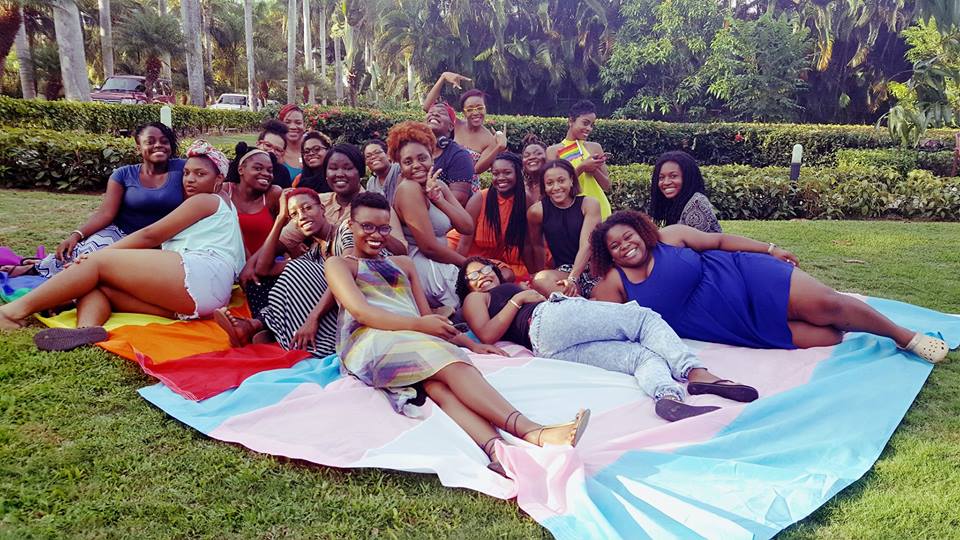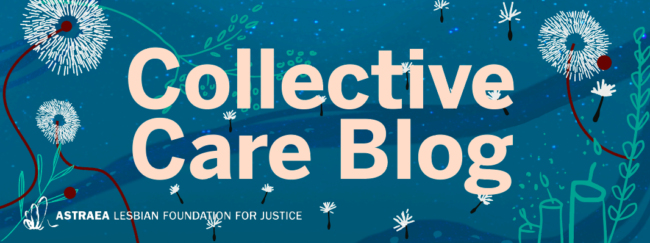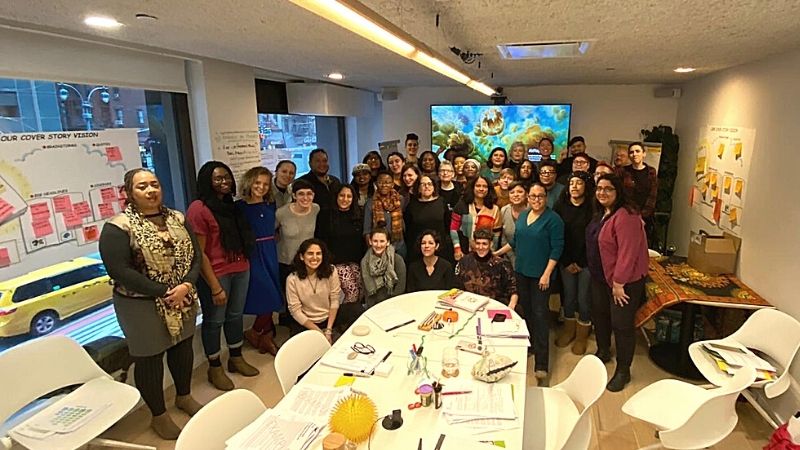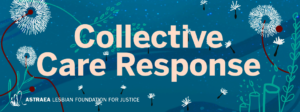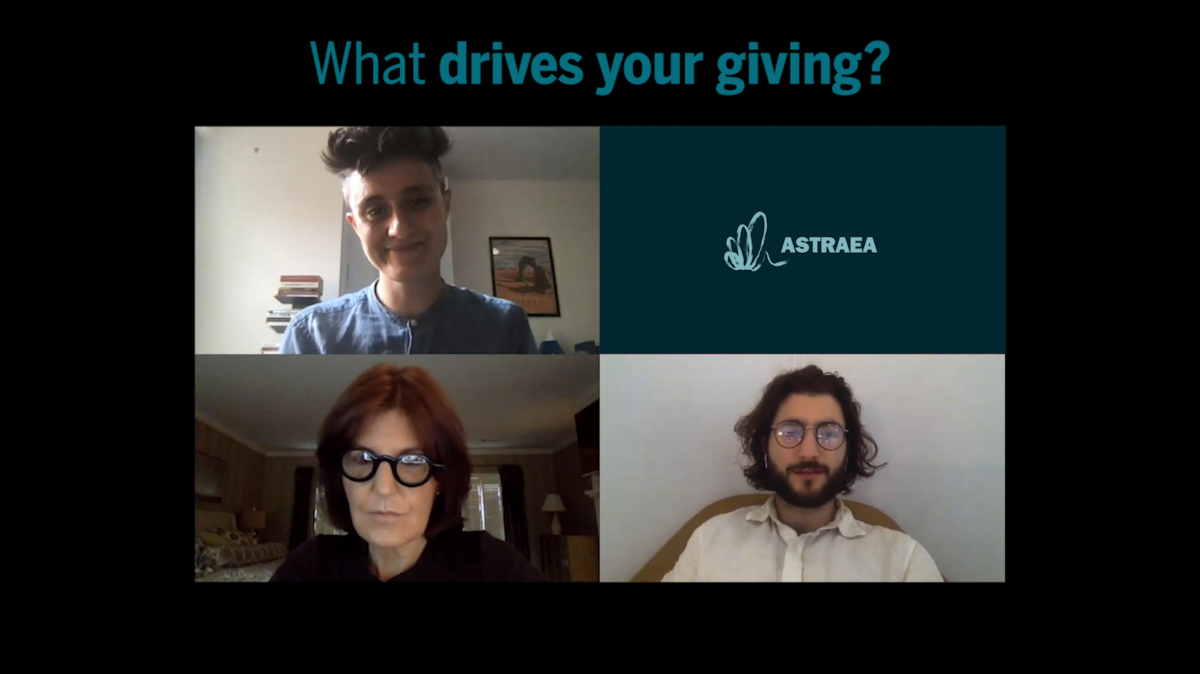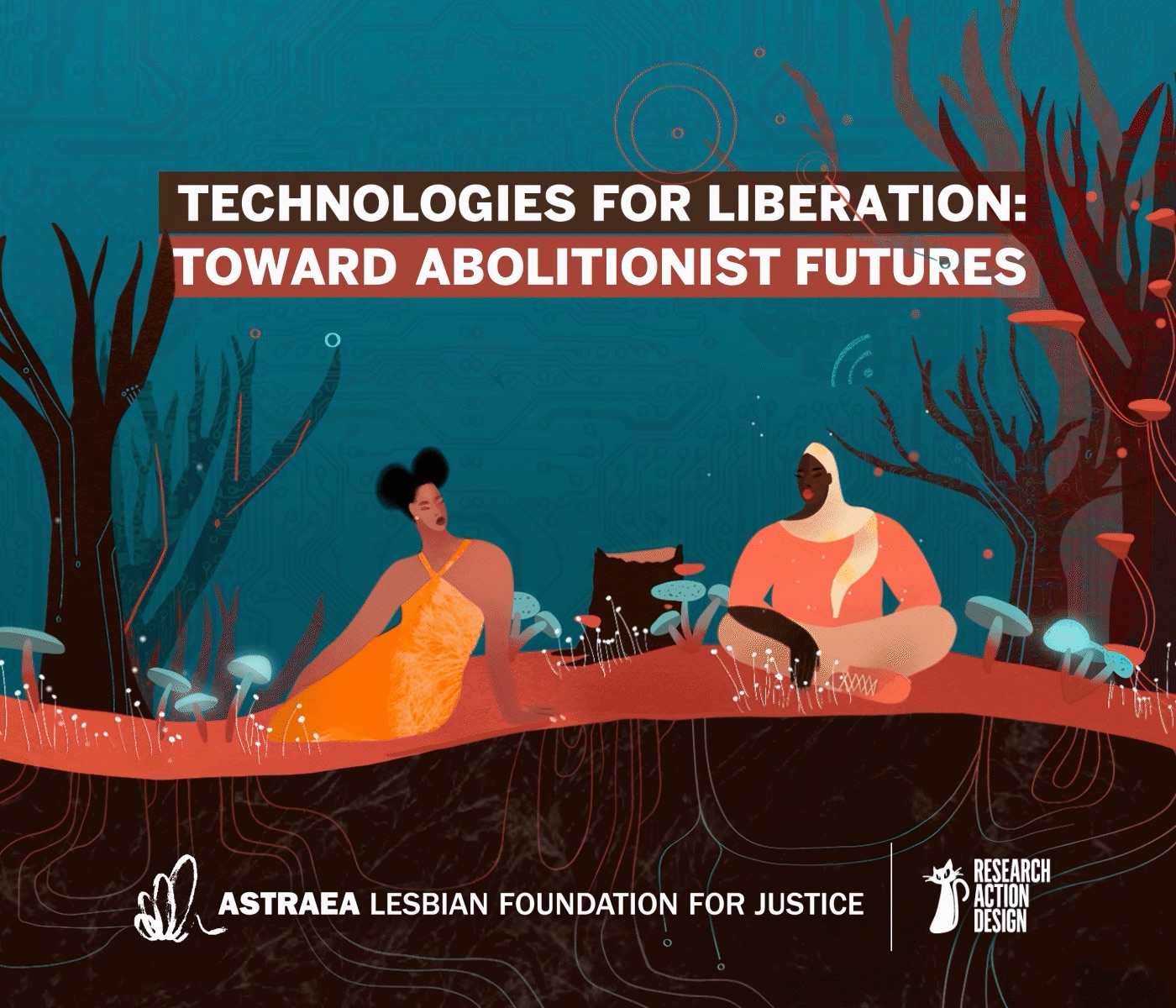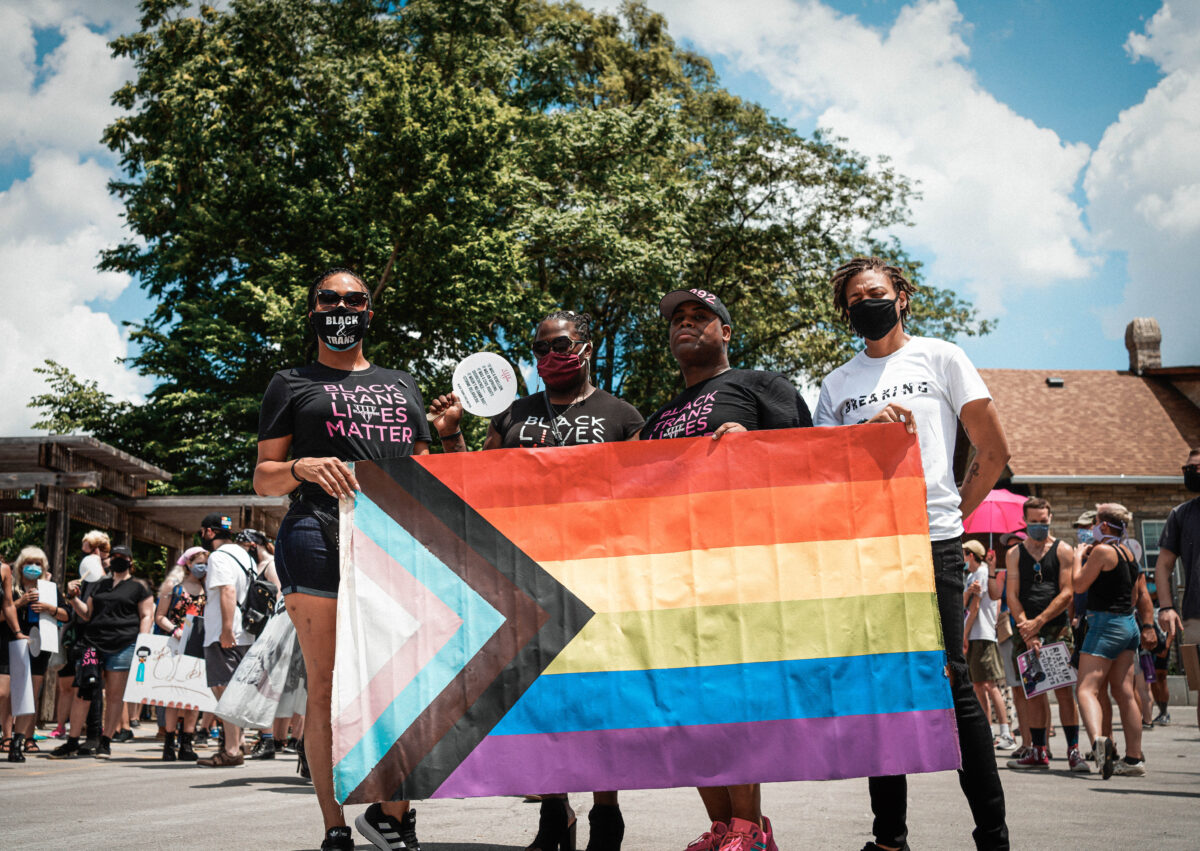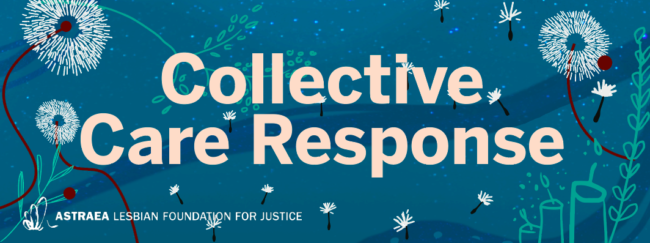
Astraea’s blog, Collective Care Blog: Building the Power & Resilience of LBTQI Movements Now & for the Long Haul, is Astraea’s response to the global COVID-19 pandemic. As a feminist LBTQI funder, we believe it is our responsibility to shed light on the ways our communities are particularly impacted by the crisis, share insights around the criticality of healing justice and collective care, as well as the ways in which we’re digging deep to keep shifting power to the grassroots in meaningful and sustainable ways.
***
Everything people are doing to take care of the community can be seen as healing justice or collective care and this work has been part of the practices of the intersex movement since its very beginning. It is the very reason the intersex movement was born in the first place.
– Loé Petit, Intersex Human Rights Fund Program Associate
On November 8, we commemorated Intersex Day of Solidarity, an annual day of remembrance during which we reflect on the ongoing struggles of the global intersex community. This year in particular, the global intersex community—like so many other marginalized communities around the world—has been deeply impacted by the COVID-19 pandemic and its ongoing knock-on effects. From financial hardships to isolation from their chosen communities, intersex people and the growing global intersex movement are experiencing numerous challenges to their ability to survive, organize, and thrive. Yet simultaneously, intersex organizations have continued tirelessly to look out and provide for each other, from building critical online community spaces to setting up mutual aid networks.
As the pandemic continues to rage across the globe, intersex organizations—which are already amongst the most vulnerable in terms of their access to resources and support—need sustained, flexible funding to be able to grow and build power for their movements and themselves. We caught up with Astraea Intersex Human Rights Fund (IHRF) Senior Program Officer, Ruth Baldacchino, and Program Associate, Loé Petit, to find out more about how intersex communities have been impacted by the pandemic, how they’re adapting their work to best serve their communities in this changing world, and what they need to see them through.
[This interview has been edited for clarity and length.]
How have intersex organizations and movements had to adapt their strategies to meet the COVID-19 moment?
Loé Petit: All our grantee partners have had to adjust their strategies and activities. A lot of groups have shifted a lot of their work online to try and create a sense of community in the face of restrictions on movement. OII Europe for example started a series they are calling “Camp Fires” where intersex community members and activists come together to watch movies together and then discuss them. Other grantee partners who regularly provide peer support or family support have moved those activities online. Additionally, while many groups have moved online, groups like the Intersex Community of Zimbabwe have been physically going to rural areas to do trainings around making hand soap and hand sanitizer. In Asia, many of our grantee partners have been providing mutual aid support through either direct donations to those in need and/or supplying food.
Ruth Baldacchino: The main takeaway of all this is that everyone has been impacted and people are not only having to change their strategies but also—like us—shifting the way they work, where they work, how to engage with their members or with other community members. Many have also repurposed their grants, shifting that money from support to the organization to buying, as Loé said, food packages and supporting community members even with temporary accommodations, and medical and other basic supplies.
Can you tell us a little bit more about how the pivot to primarily online work has been for intersex groups?
RB: Yeah, so even pre-COVID different groups engaged with their members differently; they had different strategies. Some were already doing a lot of online work and they were connecting with other members or other intersex organizations via social media and online, others were doing more community work, going into towns and villages to reach out and support families.
Existing infrastructure challenges play a critical role in this: those who did not have the best access to the internet are still facing those challenges, and in some cases they’ve worsened. It’s also a bit early to determine the long-term impact and shifts. In the first few months, people were really addressing the emerging and very urgent needs like access to food and other supplies, and if this goes on longer I think groups will be continuing to rethink and rework their campaigns and their strategies.
LP: Yeah, I agree. When we talk about shifting to online campaigns, it really depends on the capacity and local infrastructure that is available. In some regions, like parts of Africa and Latin America, it makes things much harder, while in other regions—especially for those not living in big cities—shifting online has in some cases allowed people to gather more easily because more people can join from their homes.
How have intersex activists and organizers been specifically impacted by the restrictions on movement as a result of the pandemic?
LP: One of the first things that comes to mind is the postponement of the 5th International Intersex Forum which was originally scheduled to take place in March of 2020. This year would have been the first international forum since 2017—and the movement has grown and changed a lot since then—and its postponement has had a real impact on intersex movements’ morale as well of course as their capacity building. The forum eventually took place as an online conference from September 30 – October 26, 2020, which was obviously very different than having it in person because while the conference part of the forum is important, it is usually in those other moments, when organizers get together socially and more informally and meet as human beings that connections are really formed. And I would say this is especially important in the intersex community because there are still such few spaces where intersex people can gather and meet.
As I’ve said previously, shifting to online meetings is sometimes more inclusive because it allows those who have less mobility to take part as well. But moving online shifts the focus of these meetings to be centered around political activism work, and doesn’t allow for as much trust building between humans. So I think that could have an impact on the capacity of the grantees to build stronger regional networks, and especially with new people. It becomes especially difficult for a newer generation of activists to get involved, because the regional in-person meetings are also a way to learn from and meet more experienced activists.
RB: I agree, and one of the things that we’ve always argued as a fund and as Astraea, is the need to support the creation of spaces, physical spaces. We’ve built a lot of our work around supporting those spaces, whether it’s the regional meetings, other capacity building work, or the forum. As someone who’s been in those spaces for many years, I could see the huge impact they have had on the movement. We’ve seen declarations, consensus statements coming out from the movement. We’ve seen organizations being formed. We’ve seen agreements and disagreements as well, but that’s how movements emerge. This restriction of movement is significant.
Additionally, these spaces have also become incredibly important for donors. Donors wait to see the outcomes and the key decisions that are made in these meetings. So this also impacts our work as a fund, as a donor. We’ve all built our work around movement, literally moving. For me as a program officer, the conferences and those spaces were always an opportunity to connect, form friendships, and get to understand the intersex activist landscape better.
What has the impact of all this meant for intersex organizations’ ability to do advocacy work?
RB: A lot of the advocacy has stopped or slowed down because people aren’t able to be at the institutions where that work is usually carried out, whether those are regional human rights institutions, or international ones, like the UN. This is of course not just an intersex movement issue. This is a big concern because advocacy strategies are important, they build on past work, they build on connections, on networks, on being in the same physical space as the policymakers and the governments. So it’s difficult to imagine what this means, for activists to not be able to be in New York or in Geneva and keep that momentum, to have human rights mechanisms and treaty bodies really listen to intersex people directly when they’re reviewing countries, when they’re making recommendations.
Shifting gears a little bit, can you speak about the economic impacts of the pandemic for intersex people and movements?
LP: So at the moment of course we don’t have enough quantitative data, but what we do know as I’ve mentioned is that in general people in more informal sectors and non-traditional sectors—which many intersex people are a part of—have been badly affected. Beyond this, I think it’s important to name the ways in which some funders have shifted their priorities and the impact that is having on intersex organizations.
RB: Yeah, what we saw as well as what grantees have reported, was some donors shifting priorities and sometimes also reducing funding for LGBTQI programing and shifting it to development or humanitarian aid as the pandemic hit. That was very worrying because that happened instantly with some funders. It didn’t allow groups to plan or to find other sources of funding to mitigate the effects, and that is still a concern. As donors that’s definitely on our mind.
Following up on that, what do you believe Astraea and the IHRF’s specific role is through this pandemic, both from the perspective of supporting intersex grantees, but also in terms of advocating for more intersex funding with other donors?
RB: Primarily what we started noticing earlier this year when the pandemic began spreading throughout the world and we started learning more about its impacts, was that intersex people were not being mentioned anywhere. They were absolutely missing from all the conversations that donors were having around the impacts of COVID-19. Even within LGBTQI donor spaces, as we were shifting our work to online meetings, trying to understand how to react and support our grantees in this pandemic, intersex people were missing from the conversation. So that has definitely been a big part of our role, to create donor spaces to specifically discuss intersex issues and to share with other donors what we’re hearing and learning from our grantees. That’s always been our role as a fund, but this year it’s particularly important.
In these spaces, we share a lot of what we’ve just discussed and we highlight—as we always have—the need for flexible funding. I think the pandemic really reinforces that need. Because of the flexible funding we provided, grantees were in a position to shift their programming, to shift their grants to buy food, provide shelter and accommodation. If that funding was restricted funding, they wouldn’t have been able to do that. And I think hopefully this year should have been a clear reminder to funders that flexible funding is the only way to support movements and intersex organizations. That remains our key message because of all these emerging issues and challenges, flexible funding is the only way to support a movement sustainably and on a longer term.
Finally, how do and how have intersex organizations incorporated healing justice and collective care strategies into their work and activism?
RB: In some ways, this is a question of how we frame healing justice and collective care strategies in relation to intersex movements. For intersex communities and movements, addressing trauma through different strategies and approaches has always been one of the ways that intersex organizations have practiced collective care and healing justice.
LP: I think the work of intersex organizations has really always been about centering community. So when I spoke about OII Europe organizing ‘Camp Fires’ to keep up the morale, that’s community care. And when I spoke about Intersex Community of Zimbabwe delivering trainings on how to make soap and sanitizer, that’s community care. Everything people are doing to take care of the community can be seen as healing justice or collective care and this work has been part of the practices of the intersex movement since its very beginning. It is the very reason the intersex movement was born in the first place.
***
Want to read more from our Collective Care Blog? Follow us on Facebook, Twitter, or Instagram to stay up-to-date on the latest posts!

